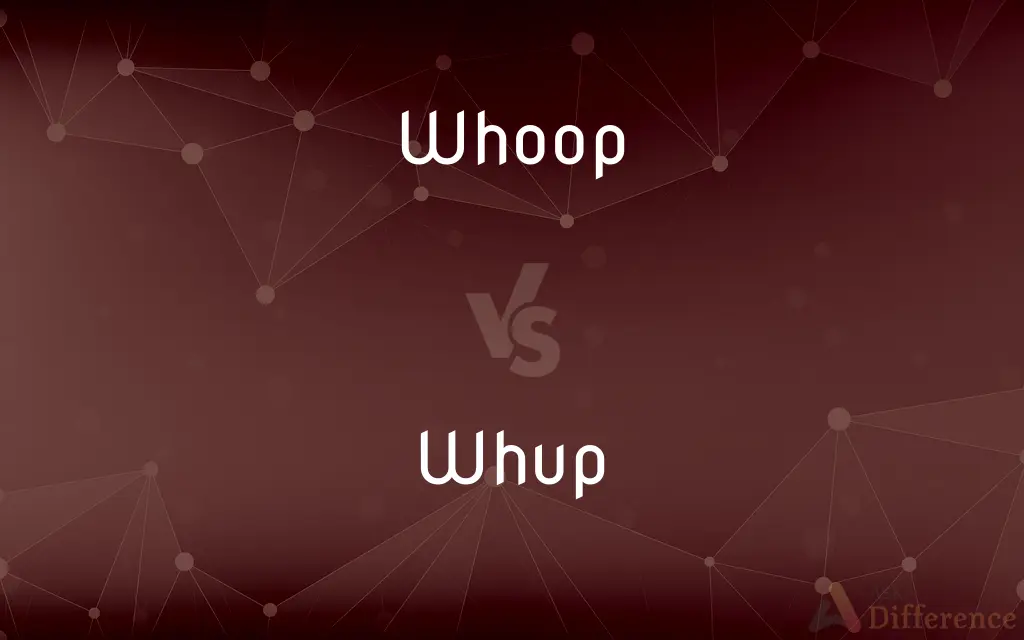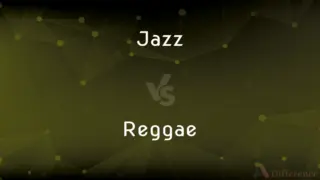Whoop vs. Whup — What's the Difference?
Edited by Tayyaba Rehman — By Maham Liaqat — Updated on May 7, 2024
"Whoop" refers to a loud, excited shout, often used to express enthusiasm or joy, while "whup" is a colloquial term for beating or defeating someone decisively.

Difference Between Whoop and Whup
Table of Contents
ADVERTISEMENT
Key Differences
Whoop is commonly used as a verb or a noun to describe a loud, enthusiastic cheer or shout, typically expressing excitement or joy. This usage can be found in contexts ranging from sports events to celebrations. On the other hand, whup is a colloquial and informal verb, primarily used in American English, meaning to beat someone thoroughly, often in a physical or metaphorical sense.
Whoop can also be part of phrases like "whoop it up," which means to celebrate noisily and exuberantly. It's associated with positive and high-spirited occasions. Whereas, whup often appears in contexts of competition or conflict, suggesting a dominant victory, such as in the phrase "whup someone’s ass."
Whoop is phonetically and emotionally expressive, often used in spontaneous moments of elation. It can also signify a rallying cry among groups. Whereas, whup carries a more aggressive connotation, linked to the idea of overcoming or subduing an opponent.
In medical terminology, whoop is associated with the distinctive cough following the intake of breath in pertussis (whooping cough). On the other hand, whup has no such associations with medical or health-related contexts, maintaining its informal status in everyday language.
The word whoop can be traced back to the late Middle English period, derived from the Old French word "houper," to cry out. Whereas, whup is a variant of "whip," reflecting its more recent and informal evolution in language use.
ADVERTISEMENT
Comparison Chart
Meaning
A loud, excited shout or cheer
To beat or defeat decisively
Usage Context
Celebrations, expressions of joy
Conflicts, competitive scenarios
Associated Phrases
"Whoop it up"
"Whup someone’s ass"
Connotation
Positive, joyful
Aggressive, dominant
Origin
Late Middle English "houper"
Variant of "whip"
Compare with Definitions
Whoop
To shout or cheer loudly.
They whooped for joy as the fireworks began.
Whup
To beat thoroughly.
The champion whupped the challenger in three rounds.
Whoop
A loud, enthusiastic shout.
The crowd let out a huge whoop when the goal was scored.
Whup
To defeat decisively in a competition.
She whupped all her opponents in the chess tournament.
Whoop
To make a loud, joyous sound.
Everyone whooped in excitement at the surprise announcement.
Whup
To outdo or surpass.
They planned to whup last year's sales records by a wide margin.
Whoop
To express enthusiasm vocally.
The fans whooped up their team from the stands.
Whup
To thrash or punish.
The team was ready to whup their rivals in the upcoming game.
Whoop
A loud, celebratory noise.
The whoop at the concert was deafening.
Whup
To overcome or subdue.
He claimed he could whup anyone at arm wrestling.
Whoop
A loud cry of exultation or excitement.
Whup
Variant of whip.
Whoop
A shout uttered by a hunter or warrior.
Whup
Alternative form of whoop.
Whoop
A hooting cry, as of a bird.
Whoop
The paroxysmal gasp characteristic of whooping cough.
Whoop
To utter a loud shout or cry.
Whoop
To utter a hooting cry.
Whoop
To make the paroxysmal gasp characteristic of whooping cough.
Whoop
To utter with a whoop.
Whoop
To chase, call, urge on, or drive with a whoop
Whooping the cattle down the road.
Whoop
A loud, eager cry, usually of joy.
Whoop
A gasp, characteristic of whooping cough.
Whoop
A bump on a racetrack.
Whoop
(intransitive) To make a whoop.
Whoop
(transitive) To shout, to yell.
Whoop
To cough or breathe with a sonorous inspiration, as in whooping cough.
Whoop
To insult with shouts; to chase with derision.
Whoop
To beat, to strike.
Whoop
To defeat thoroughly.
Whoop
The hoopoe.
Whoop
A shout of pursuit or of war; a very of eagerness, enthusiasm, enjoyment, vengeance, terror, or the like; an halloo; a hoot, or cry, as of an owl.
A fox, crossing the road, drew off a considerable detachment, who clapped spurs to their horses, and pursued him with whoops and halloos.
The whoop of the crane.
Whoop
A loud, shrill, prolonged sound or sonorous inspiration, as in whooping cough.
Whoop
To utter a whoop, or loud cry, as eagerness, enthusiasm, or enjoyment; to cry out; to shout; to halloo; to utter a war whoop; to hoot, as an owl.
Each whooping with a merry shout.
When naught was heard but now and then the howlOf some vile cur, or whooping of the owl.
Whoop
To cough or breathe with a sonorous inspiration, as in whooping cough.
Whoop
To insult with shouts; to chase with derision.
And suffered me by the voice of slaves to beWhooped out of Rome.
Whoop
A loud hooting cry of exultation or excitement
Whoop
Shout, as if with joy or enthusiasm;
The children whooped when they were led to the picnic table
Whoop
Cough spasmodically;
The patient with emphysema is hacking all day
Common Curiosities
What are the common contexts to use "whoop"?
Whoop is often used during celebrations, sports events, and any scenario involving excitement or cheer.
Is "whoop" appropriate for formal communications?
Whoop is generally considered informal and is best used in casual or enthusiastic contexts rather than formal communication.
Are there any regions where "whup" is more popular?
Whup is predominantly used in American English, particularly in Southern and rural dialects.
How does the intensity of expression differ between "whoop" and "whup"?
Whoop expresses high energy and joy, while whup conveys a strong, sometimes aggressive intention to defeat.
Can "whoop" be considered onomatopoeic?
Yes, whoop is considered onomatopoeic as it mimics the sound of a loud cheer or shout.
Can "whoop" be used metaphorically?
Yes, "whoop" can be used metaphorically to describe any loud, celebratory action, even if no actual sound is made.
Are there any famous quotes or idioms that include "whoop"?
A well-known phrase is "Whoop it up," which means to celebrate or make merry loudly and enthusiastically.
What is the origin of the word "whup"?
Whup originated as a variant of "whip," evolving in American English to express the act of defeating or beating someone.
What kind of linguistic register is "whoop" associated with?
Whoop is associated with an informal, expressive linguistic register, typically used in lively social interactions.
Is there a specific demographic that uses "whup" more frequently?
Whup is more frequently used among younger generations and in informal settings, often within American English speakers.
In what types of expressions can you find "whup"?
Whup is commonly found in expressions involving competition or physical contests, such as "gonna whup you in the game."
How do the uses of "whoop" and "whup" reflect cultural differences?
Whoop is broadly used across various English-speaking cultures in festive contexts, whereas whup, particularly in its aggressive sense, is more specific to American colloquial usage.
How does "whup" compare to similar verbs like "beat" or "defeat"?
Whup is more informal and carries a stronger implication of easy or decisive victory compared to the more neutral "beat" or "defeat."
Does "whup" carry negative connotations?
While not inherently negative, whup often carries aggressive or competitive overtones, which can be perceived as negative depending on the context.
What variations of spelling or pronunciation exist for "whup"?
Whup may also be spelled "whop," and while pronunciation can vary, it typically rhymes with "cup."
Share Your Discovery

Previous Comparison
Jet vs. Spray
Next Comparison
Jazz vs. ReggaeAuthor Spotlight
Written by
Maham LiaqatEdited by
Tayyaba RehmanTayyaba Rehman is a distinguished writer, currently serving as a primary contributor to askdifference.com. As a researcher in semantics and etymology, Tayyaba's passion for the complexity of languages and their distinctions has found a perfect home on the platform. Tayyaba delves into the intricacies of language, distinguishing between commonly confused words and phrases, thereby providing clarity for readers worldwide.











































